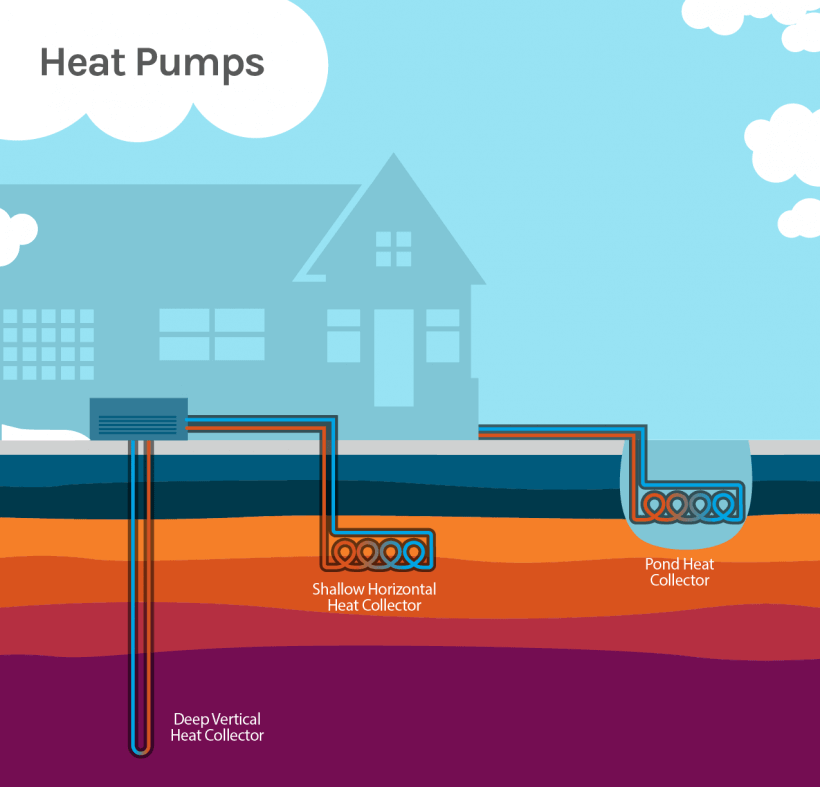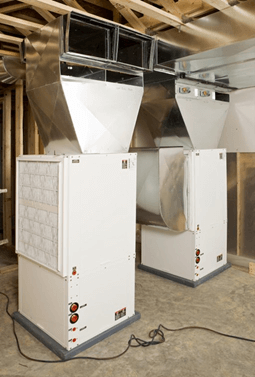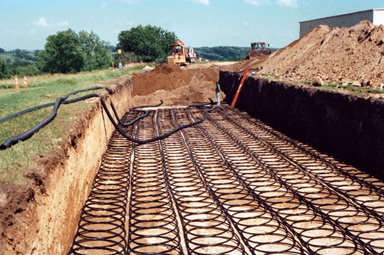Geothermal Heat Pumps – The Ultimate Montreal Homeowner’s Guide
Montreal homeowners, are you searching for a revolutionary way to heat and cool your home while reducing energy costs and shrinking your carbon footprint? Geothermal heat pumps (also known as ground source heat pumps, thermopompe géothermique, or géothermique pompe à chaleur) could be the perfect solution. They offer outstanding efficiency, environmental sustainability, and unparalleled comfort even during Montreal’s harshest weather.
This comprehensive guide will dive deep into the world of geothermal heat pumps, ground source heat pump vs air source, plus information about geothermal heat pump cost equipping you with the knowledge you need to determine if this innovative technology is right for you to decide install geothermal heat pump.
Definition: What is a Geothermal Heat Pump?
A geothermal heat pump is a technologically advanced heating and cooling system that harnesses the Earth’s naturally stored thermal energy. Unlike traditional HVAC systems that rely on burning fossil fuels (like gas furnace) or outdoor air temperatures (air source heat pump ), geothermal heat pumps leverage the relatively constant temperature below the Earth’s surface to efficiently provide heating, cooling, and even hot water for your home.

How Geothermal Heat Pumps Work
- The Ground Loop: A network of pipes is buried underground, either horizontally or vertically, depending on soil conditions and space constraints. A water-based solution with antifreeze circulates through these pipes.
- The Heat Pump: The heat pump unit, housed inside your home, is the heart of the system. It acts as a heat exchanger, transferring heat between the ground loop and your home’s indoor environment.
- Heating Mode: During winter, the circulating fluid absorbs heat from the ground and transfers it to the heat pump, then the refrigerant transfers this heat to the air circulating in the home.
- Cooling Mode: In summer, the process reverses. The heat pump extracts warmth from your home, and the ground loop dissipates it into the cooler earth.
Advantages of Geothermal Heat Pumps
- Extreme Energy Efficiency: Geothermal heat pumps are among the most energy-efficient HVAC systems on the market. They can save a lot on your heating and cooling bills compared to traditional systems.
- Environmental Friendliness: By using a renewable energy source, geothermal heat pumps drastically reduce your carbon emissions, contributing to a cleaner environment.
- Cost Savings and Incentives: While there are upfront costs, geothermal heat pumps pay for themselves over time through lowered energy bills. Montreal and Quebec offer various government incentives and rebates to further offset the investment.
- Exceptional Comfort: Geothermal systems provide consistent, even heating and cooling throughout your home, regardless of extreme outdoor temperatures.
- Longevity: Well-maintained geothermal heat pumps have a lifespan of 25+ years for the indoor unit and 50+ years for the ground loop, exceeding the lifespan of conventional HVAC systems.
Disadvantages of Geothermal Heat Pumps
- Upfront Investment: The initial cost of geothermal heat pump is typically much higher than conventional HVAC systems.
- Complex Installation: The process of drilling or trenching to install the ground loop requires specialized equipment and expertise.
- Space Requirements: Geothermal systems may not be the best fit for properties with limited outdoor space.
Costs and Financial Considerations
Geothermal heat pump costs vary based on factors like your home’s size, the ground loop type, and local labor rates. Here’s a general cost breakdown:
- Geothermal Heat Pump Unit:$2,500 – $7,000
- Ground Loop Installation:$10,000 – $30,000 (varies depending on size and complexity)
- Ductwork (If Needed):Additional costs may apply.
Important: Generous government incentives are available in Montreal and Quebec to significantly reduce the cost of installing a geothermal heat pump.

Types of Geothermal Heat Pumps
Geothermal heat pumps primarily fall into two main categories: closed-loop systems and open-loop systems.
Closed-Loop Systems
Closed-loop systems are the most common type of geothermal heat pump installation in the Montreal area. These systems feature a continuous loop of sealed, durable piping filled with a circulating water-based antifreeze solution. There are three primary configurations:
- Horizontal Closed-Loop:
- The most cost-effective option if you have adequate land space.
- Pipes are buried in horizontal trenches approximately 4-6 feet deep.
- Requires a larger land area, making it best suited for sizable lot sizes.
- Vertical Closed-Loop:
- Ideal for smaller or urban properties with limited space.
- Pipes are inserted into boreholes drilled 100-400 feet deep.
- Higher upfront costs due to drilling requirements, but less land disturbance for small lots.
- Pond/Lake Closed-Loop:
- Used when a sufficient body of water (pond, lake) is available on or near the property.
- Coils of pipes are submerged below the frost line.
- Less common in the Montreal area due to limited suitable water sources.
Open-Loop Systems
- Less prevalent in Montrealdue to regulations and the need for suitable, high-quality groundwater sources.
- Operation:Instead of a closed loop, an open-loop system draws water from a well or surface water source, uses it for heat exchange, and returns it to the ground or water source.
Ground Source Heat Pumps vs. Air Source Heat Pumps
Both GSHPs and ASHPs tap into renewable energy and offer increased efficiency compared to traditional heating and cooling systems. However, they differ significantly in how they source their heat:
- GSHP (Geothermal):Harnesses the stable temperature of the earth below the frost line.
- ASHP:Extracts heat from the outside air, even when temperatures are low.
Key Differences
- Efficiency and Climate Impact:
- GSHP: Due to their stable, underground heat source, geothermal systems have superior overall efficiency (higher Coefficient of Performance – COP), especially in climates with extreme winters like Montreal.
- ASHP: While still efficient, ASHP efficiency diminishes as outside temperatures drop, sometimes requiring backup heating systems for the coldest days.
- Cost:
- GSHP: Higher initial investment is a major factor for geothermal heat pump cost which is due to ground loop installation (drilling or trenching).
- ASHP: Lower upfront costs, comparable to a traditional air conditioner installation.
- Longevity:
- GSHP: Exceptionally long lifespan – 25+ years for the indoor unit, and 50+ years for the ground loop.
- ASHP: Shorter lifespan, around 15-20 years on average.
- Space Requirements:
- GSHP: Ground loop requires outdoor space either for horizontal trenches or vertical boreholes.
- ASHP: Minimal outdoor footprint – just the air source unit takes up minimal space.
- Maintenance:
- GSHP: Lower maintenance needs; the ground loop is virtually maintenance-free.
- ASHP: May require slightly more frequent maintenance, as they’re exposed to outdoor elements.

When GSHP is the Better Option in Montreal
- Highest Efficiency:If maximum energy savings and the lowest possible carbon footprint are top priorities, GSHPs are the clear winner.
- Severe Winters:Geothermal systems provide consistent, dependable heating even during the coldest parts of Montreal winters.
- Longevity:With proper maintenance, geothermal systems will outlast several generations of conventional systems or ASHPs.
When ASHPs are a Good Fit in Montreal
- Smaller Lots:ASHPs are suitable where space is limited, making ground loops difficult.
- Budgetary Constraints:If upfront costs are a primary concern, ASHPs offer a more affordable entry point into heat pump technology. Because ground source heat pump cost is higher than air source heat pumps.
- Supplemental Heating:If you have an existing efficient heating system, an ASHP can offer significant cost savings during the shoulder seasons and milder winter periods.
Choosing the Right System for Your Montreal Property
The optimal type of geothermal heat pump system for your home depends on:
- Land Availability:Horizontal loops need significant space, vertical loops are ideal for smaller lots.
- Soil Conditions:Rocky soil may increase costs for vertical drilling.
- Proximity to Water Sources:If a suitable water body is available, a pond/lake loop might be feasible.
- Local Regulations:Be sure to research any Montreal-specific requirements regarding open-loop installations.
Professional Consultation is Key
Choosing the right system is crucial for your geothermal investment. A qualified geothermal installer will conduct a thorough assessment of your property, energy needs, and budget to help you determine the best type of geothermal system for your Montreal home.
At estimationclim, we offer you the best consultancy services for ground source heat pumps. So don’t miss out on year-round comfort and geothermal savings! Take advantage of current incentives and get your free quotes now – start your journey to a more energy-efficient Montreal home.
You can also read more about related topic in our HVAC maintenance guide!